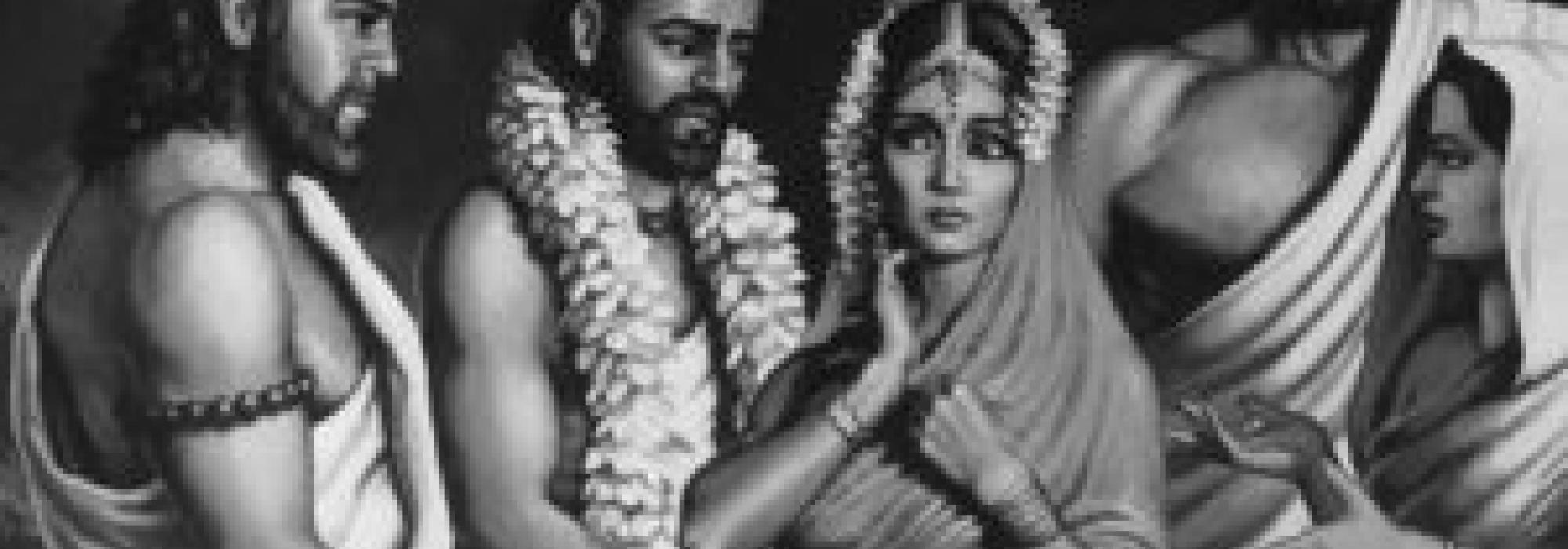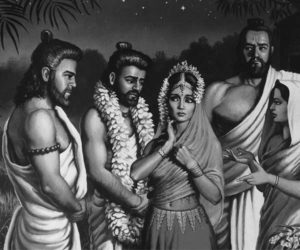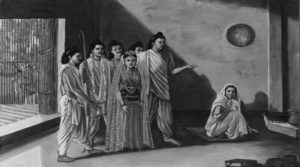As the celebration of the svayaṃvara started, the crowd at the venue kept growing; actors and dancers entertained them and were rewarded with precious gems. Fifteen days passed this way and on the sixteenth day, Draupadī took her sacred bath, wore a grand sari and decked herself with magnificent ornaments. She held a golden vīra-kalaśa and entered the stage. As she entered, the musical instruments grew silent and Dṛṣṭadyumna entered the stage. With a voice that was as deep as thunder, he announced, “Dear kings! Pay attention! Look at this bow, these arrows, and the target! Contestants must shoot five arrows such that they go through the hole in the mechanised obstacle and hit the target. Anyone who is able to shoot in such a manner will get to marry my sister, if in addition, he is from a good family, is of good conduct and is good-looking too. He then turned to his sister and said, “My dear Kṛṣṇā! He is Duryodhana, he is Durmukha, this is Duśśāsana. Here are Yuyutsu, Karṇa, Śakuni, Aśvatthāma and Virāṭa. There sits Śalya, the king of the Madra province. This is Balarāma, he is Vāsudeva, these are Akrūra and Sātyaki – all of them and kings of different countries have come to win your hand. You may marry anyone who is able to display their skill in hitting the target!” The kings who were seated there, came one after the other, proclaiming themselves to be the most skilled and powerful. Most of them were in the prime of their youth, handsome, and belonged to good families; thus they all thought that Kṛṣṇā would be theirs. Even as they entered the arena, friends turned into rivals. None was able to string the bow. In their attempt to lift and string the bow, the kings fell to the floor, broke their armlets and earrings and left the place, humiliated. The royal assembly looked devastated.
The audience was shocked. Arjuna, who was seated amidst the brāhmaṇas, got up and walked towards the bow. Looking at him, who was as grand as the Indradhvaja, the brāhmaṇas waved their kṛṣṇājina to greet him. Some cast their looks down and bent their heads. “While experts in archery such as Karṇa, Śalya and other great heroes have not been able to bend the bow, will this weak brāhmaṇa—who has no exposure to archery—bend it? The kings will only mock such brāhmaṇas!” Some others exclaimed, “Look at his features! He looks like the Himalayas! His arms are like the trunk of an elephant! He might even complete the task, who knows! Would anyone, who is not strong enough, go ahead so boldly?” Even as the brāhmaṇas were speaking to each other, Arjuna stood before the bow, like a mighty mountain. He respectfully bowed down to the bow; he strung the bow and hit the target with all the five arrows in no time. Floral showered anointed Arjuna; the sound of trumpets echoed all around; there was a commotion in the assembly. Everyone assembled there displayed wonder and exclaimed, “Aha! Aha!” The attendants of the king (vandhi-māgadhas) praised Arjuna. Amidst this commotion, Yudhiṣṭhira returned to his tent along with his brothers Nakula and Sahadeva. Draupadī garlanded Arjuna, who was successful in completing the task. Happiness bloomed on his face. Even as the brāhmaṇas gathered around to praise him, Arjuna left the arena and went away with the girl he had won. The kings who had gathered for the svayaṃvara grew angry with Drupada as he was giving away his daughter to a brāhmaṇa. “Let us kill this wicked king! He has humiliated us all and has given away a gem like Draupadī to a brāhmaṇa. We must abide by some kind of rules in this matter; he has invited so many kings, provided hospitality
and has insulted them. Is there no one in this assembly of kings, which resembles the Deva-sabhā, who can take on King Drupada? What role does a brāhmaṇa have in a svayaṃvara? It is meant only for the kṣatriyas; if the girl does not accept any of us, let us put her into fire and leave for our kingdoms; we need not kill the brāhmaṇa if he has done so out of arrogance or greed. We should uphold our self-respect and dharma; hereafter, no svayaṃvara will take such a pitiable state!” Saying so, they tried attacking Drupada, like elephants in rut. Bhīma and Arjuna stopped them and it lead to a brawl. The brāhmaṇas threw their kṛṣṇājina and kamaṇḍalu at them; laughing at them, Arjuna said, “You just stand aside and watch; I will hit them with my arrows and shoo them away!” Saying so, he picked up the bow he had just strung and stood with Bhīma like an unyielding mountain. Looking at them, the kings there exclaimed, “If a brāhmaṇa gets into a battle, we shall even kill them! Why do we need to care for these dvijas in a quarrel?” Karṇa took on Arjuna and Śalya attacked Bhīma. In a short time, Karṇa was astonished looking at Arjuna’s courage and skill at archery. He asked him “Viprottama! I am greatly impressed by your strength and skill with the arrows; are you the very embodiment of dhanurveda or are you Paraśurāma? Nobody else other than Indra and Arjuna can match me in a duel!” In reply, Arjuna said, “Karṇa, I am neither the embodiment of dhanurveda nor am I Paraśurāma; I am a brāhmaṇa possessing the knowledge of the weapons. I have gained expertise in Brahmāstra and Mahendrāstra, thanks to my guru’s teaching!” Hearing these words, Karṇa gave up fighting and left the place; he knew that he could not face the Brahmāstra. The fight between Śalya and Bhīma too was a brief one; in no time, Bhīma lifted Śalya up with his arms and the brāhmaṇas assembled there laughed out loud looking at Śalya dangling in the air. Bhīma then crashed him on the ground but did not kill him. The other kings were frightened looking at the fate of Śalya and Karṇa. They stood around Bhīma and spoke to themselves “Look at the valour of these brahmanas! We need to find out their whereabouts; Who else, other than Paraśurāma, Droṇa, Kṛpa, Kṛṣṇa and Arjuna can fight Karṇa? We also know that only Balarāma and Bhīmasena can fight Śalya. We should find this out first and then pick a quarrel with them; let us stop this fight right away!” Śrī-kṛṣṇa, who was watching the happenings, suspected that they must be Bhīma and Arjuna, especially after seeing Bhīma’s tremendous power. He pulled them all apart saying, “Why do we need to quarrel, when Draupadī has been won over in a dharmic manner?” People began leaving the arena and went in the direction of their temporary residences; and as they left, they spoke to themselves, “the brāhmaṇas were victorious in the svayaṃvara; Pāñcālī is now in the hands of the brāhmaṇas.” Bhīma and Arjuna who sustained minor injuries headed into the crowd of brāhmaṇas along with Draupadī. They were radiant with valour. It was hard for them to wade their way through the crowd. Back at their house, Kuntī was worried about her children. “It’s getting late and the boys have not returned home; what calamity could have befallen them! I hope they haven’t lost their lives, having been discovered by the Kauravas or trapped by rākaṣasas!” She was worried, thinking of the various possibilities. By about noon, Arjuna came home, like a bright sun surrounded by brāhmaṇas, like clouds. As they approached the house, the called out to Kuntī, “Mother! We have procured alms!” Even without looking at them, Kuntī replied from within, “All of you share and enjoy it!” She discovered that they had brought a girl with them only after she came out of the house. She thought “Oh! What have I done?” Embarrassed, she took the girl by hand and went to Yudhiṣṭhira. She said, “Look son! Your younger brothers have brought Drupada’s daughter to me. I, out of ignorance, and by a slip of the tongue, said, “All of you share it! My words should not be proved false and Draupadī should not be subject to adharma – what do we do now?” Yudhiṣṭhira thought for a moment and consoled his mother. Turning towards Arjuna, he said “Arjuna! You won Draupadī! You marry her with agni as the witness!” Arjuna said “No, king! Do not subject me to adharma; you should marry her first, then Bhīma, followed by me; Nakula and Sahadeva after me. This is dharma. We will all listen to you. Please think - how do we abide by dharma in such a situation? What kind of act will bring us good name and what would please the king of Pāñcāla? We shall do accordingly!” Meanwhile, all of them had lost their hearts to Draupadī and she too fell for them all. Observing this, Yudhiṣṭhira declared, “Let no one be disappointed! Draupadī shall be the wife of us all!” Everyone was contemplating upon his decision. Kṛṣṇa had grown suspicious about their identity, so he came to the potter’s workshop along with Balarāma. There, he saw Bhīma and the others seated around Dharmarāja. Even as he arrived there, he introduced himself “I am Kṛṣṇa.” He paid his respects to Dharmarāja by touching his feet. Balarāma too touched Dharmarāja’s feet. The brothers then bowed down to Kuntī. After exchange of pleasantries, “We are in hiding here: how did you get to know, Vāsudeva?” Laughing, Kṛṣṇa said, “Even if fire is hidden, it is easy to discover it. Who else, other than the Pāṇḍavas, can display such valour? You were fortunate not to succumb to the fire; all this happened due to the evil machinations of Duryodhana and his ministers. We shall retire to our tents, lest someone discover us!” Seeking their permission, Kṛṣṇa and Balarāma left the place. The prince of Pāñcāla, Dṛṣṭadyumna had silently followed Bhīma and Arjuna as they left towards their tents. He came near the potter’s workshop and was discreetly observing their behaviour and words. That evening, Bhīma, Arjuna, Nakula and Sahadeva gathered alms and brought it to Yudhiṣṭhira. Kuntī called Draupadī and said, “Take the upper layer of the food and offer it as bali and give it away as alms to brāhmaṇas. If someone in the neighbourhood asks for it, you may give them; half of the remaining portion should be given to Bhīma; he is a hero and his is the lion’s share. You may distribute the rest of the food to the six of us!” She gladly did as she was instructed. Everyone had their meal. Sahadeva then spread blades of darbha grass on the floor. Each spread their kṛṣṇājina over it and slept with their heads to the south. Kuntī slept near their heads and Draupadī by the feet. Draupadī did not find it hard to sleep on darbha; she did not express any kind of displeasure with regard to the Pāṇḍavas; as they lay on the floor, the Pāṇḍavas spoke to each other about different kinds of divine arrows, swords, mace, chariot and their conversation sounded strange. Looking at all this, an excited Dṛṣṭadyumna rushed back to his place, eager to talk to his father.
Drupada, who did not know that they were the Pāṇḍavas was worried about Draupadī. As soon as he saw Dṛṣṭadyumna, he asked “Son! Where is Kṛṣṇā? Who has taken her? I hope it not a vaiśya or a śūdra or some person of a low birth! I haven't been stepped upon by muddy feet, right? Has our floral garland fallen in a graveyard? Is she with someone belonging to the higher varṇa? Who is he, who won over my daughter? Are the Pāṇḍavas alive, by any chance and was it Arjuna who strung the bow and hit the target?” Dṛṣṭadyumna replied with delight, “Dear father, that handsome youth with broad chest and sparkling eyes looked like a deity! As you might have seen, he wore kṛṣṇājina, strung the bow and hit the target, causing it to fall to the ground. As the brāhmaṇas gathered around him to congratulate him, he left the place. Kṛṣṇā too held his kṛṣṇājina and silently followed him, just like a female elephant goes behind a tusker. The kings assembled there were unable to bear this sight and started attacking them. Another person uprooted an elephant and smashed them all; he looked like Yama! The two, who were radiant like the Sun and the moon came to a potter’s workshop in the outskirts of the city. There, a lady, who was brilliant like fire—she must be their mother—was sitting there along with three other young men, who were brilliant, just like her. These two men left Kṛṣṇā at their residence and left for begging; once they returned after gathering alms, Kṛṣṇā received the food they had got, offered a part of it as bali and kept aside some portion for the brāhmaṇas. She served the food to the older lady and to the heroes and ate her share. They spread darbha grass and kṛṣṇājina on the floor and slept over it. Kṛṣṇā slept by their feet. The men started speaking strange things; their voices were like deep thunders coming from a dark cloud. The words they spoke cannot be uttered by a brāhmaṇa, vaiśya, or a śūdra. They certainly are kṣatriya heroes. I am so sure because, everything they spoke was related to war! It is clear that the Pāṇḍavas have escaped from fire and have fulfilled our long-time desire. It is Arjuna who strung the bow and hit the target and it was the Pāṇḍavas who were speaking to each other in this manner. It looks like they are moving about in disguise!” Drupada was thrilled. He called his purohita and instructed him to find out if they were really the Pāṇḍavas. The purohita came to the Pāṇḍavas and told them thus: “Revered ones! Drupada, the king of Pāñcāla would like to get introduced to you. He has sent the following message: I am greatly delighted by the fact that one of you completed the assigned task successfully. The king Pāṇḍu was my close friend. He is no different from me and I am not different from him – such was our thick friendship. I always wanted to give my daughter in marriage to his son Arjuna! Thus I request you to let me know your family background!” Listening to these words, Yudhiṣṭhira had Bhīma offer him arghya, had his feet washed, and got him seated on a comfortable chair. He said, “O revered brāhmaṇa! The king of Pāñcāla had arranged a contest, as is natural for a king and is sanctioned by the rāja-dharma. He had declared that he would give his daughter in marriage to the person who wins the contest. This hero has won her accordingly. There was no restriction put on the varṇa or the family that the contestant belongs to. When such is the case, why should Drupada be sorrowful? His wish is fulfilled anyway! Can the bow be bent by a weak person? Can such a person string it? Can a low-born, who has no training in archery, hit the target? Thus, he should not worry about his daughter anymore!” Even as Yudhiṣṭhira was speaking, another person came there from Drupada’s court. He said, “The king has arranged for a feast to celebrate his daughter’s svayaṃvara. The king requests you to wind up your work quickly and come there at the earliest, with no delay. Look here, the royal chariots are waiting for you. They are built out of golden lotuses and are pulled by strong horses. All of you kindly get on to the chariot and head towards the palace!” The Pāṇḍavas got on to the chariot along with the purohita. Kuntī and Draupadī accompanied them too.
To be continued…
This is an English translation of Prof. A R Krishna Shastri’s Kannada classic Vacanabhārata by Arjun Bharadwaj and Hari Ravikumar published in a serialized form. Thanks to Śatāvadhāni Dr. R Ganesh for his thorough review and astute feedback. Additional segments from the epic and notes by the translators have been added in the footnotes after going through the Critical Text of the Mahābhārata.














































